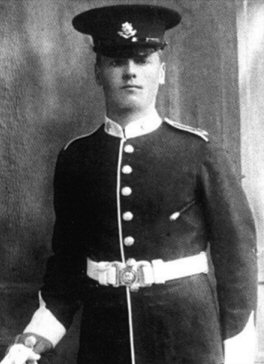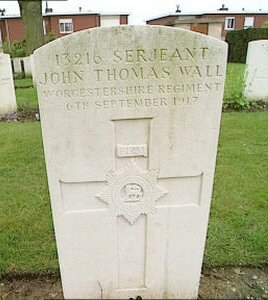| Other Info | Sergeant J. T. Wall of Bockleton, near Tenbury, Worcestershire had enlisted in the Worcestershire Regiment in 1912. He was posted to the 1st Battalion Worcestershire Regiment and after thirteen months' he was transferred to the 3rd Battalion Worcestershire Regiment. He landed as a Lance-Corporal with the 3rd Battalion on the 12th August 1914. He had fought with his Battalion in every engagement. By 1917 his combat record, exemplary discipline and very good character had secured Wall promotion to sergeant.
In August 1917 the 3rd Battalion, was directed to assault Westhoek Ridge. On the evening of Thursday, 9th August the 3rd Battalion moved up from Halifax Camp to Bellewaerde Ridge. Two companies went into trenches immediately behind the crest of the Ridge, the remaining two companies, including Wall's, relieved the 8th Border Regiment at Lake Farm and Railway Wood Dugouts.
At 2 a.m. on 10th August Company Sergeant Major J. Davies told his platoon sergeants, including Wall, to order their men to move out from Railway Wood Dugouts. Weighed down with rifles, buckets of grenades, digging implements and wire-cutters, the platoons, at 200-yard intervals, made their way towards the assembly positions. Plodding through gas-polluted mud, Wall's company was inching over Bellewarde Ridge when the leading platoon lost its way in the darkness. The British bombardment erupted. Two minutes later German heavy guns retaliated, targeting the reinforcements assembled behind the advancing troops. Caught on the exposed crest of the Ridge, Wall's platoon column was raked by storm of enemy shellfire. Lieut. Thomas Randle ordered the platoon to take cover and nine men, including Wall, huddled into a nearby concrete dugout. Others cowered outside, partially protected by the emplacement's bulky exterior. After a while Sergeant Davies, taking advantage of breaks in the bombardment, detached small parties of the more exposed group and sent them on their way up the line.
Sergeant John Thomas Wall (13216)
Amongst those who squeezed into the dugout was Pte. W. H. White, who later testified for the prosecution at Wall's trial. White recalled that after hearing a summons from outside, six of the men in the dugout departed, leaving himself, Wall and Pte. Rowlands. After the shelling had abated Wall and White emerged from the dugout, searched vainly for the rest of the Company and concluded that they had gone back to Railway Wood Dugouts.
He added "Just then the enemy got up their barrage and so we remained in the dugout. We stayed there all that day and through the next day, the 11th August, up till about 5 or 6 p.m. when the shelling had ceased."
Wall, White and Rowlands then returned to the Railway Wood Dugouts and remained there until the Company returned on the morning of 12th August, when the sergeant reported himself present to the duty sergeant. On being asked where he had been, Wall explained that he had reported what had happened to an officer from another regiment.
Wall was subsequently charged with desertion and tried by Field General Court Martial on 20th August. Sergeant Wall (age 22) was executed at 5.25 a.m. on 6th September 1917 at Poperinghe by a firing squad under the command of Captain Alfred Vint, 3 Battalion Worcestershire Regiment. |
|---|

